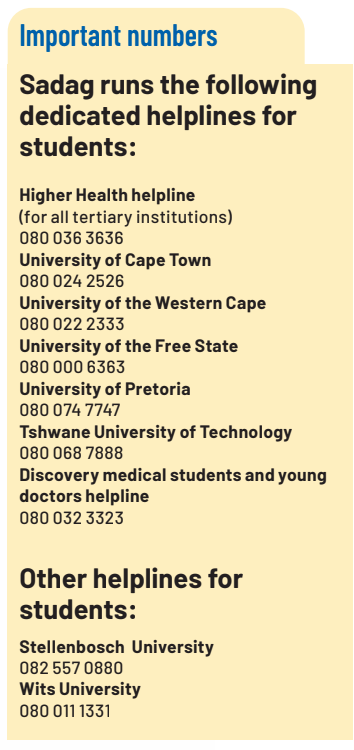MENTAL HEALTH
Students and suicide – where to get help and be heard before crisis strikes

Mental health issues often begin during young adulthood, when the pressures of studies and finances heighten the risks of self-harm.
Conversations about suicide and suicidal ideation in student environments should not take place only in response to crisis, but as part of an ongoing effort to create awareness about where to turn before crisis hits.
Some hold the misconception that speaking about suicide could “plant the seed” in people’s minds, but research around the world has shown that talking about the issue has a preventative effect, according to Cassey Chambers, operations director at the South African Depression and Anxiety Group (Sadag).
“There are a lot of universities that have resources available. If you’re a student at a university or any higher education institution it’s [about] finding out what those support services are… in case you need them or in case a friend needs them,” she said.
“The more we know about where to access health [care], [the more] we can actually prevent suicide.”
Student focus
In the wake of World Suicide Prevention Day (10 September), which was themed “Creating hope through action”, it is important to explore how hope can be created in our tertiary institutions.
The onset of mental health issues often occurs in people between the ages of 19 and 25, according to Chambers. Most of the calls Sadag gets on its helplines are from university students.
Read more in Daily Maverick: “Suicide is a global emergency and the second-leading cause of death among our young people”
“When we look at the fact that the majority of our calls are coming from young people, and that one in five calls to Sadag is suicide-related, it’s a large majority,” said Chambers.
In March 2022, Jason Bantjes, associate professor at the Institute for Life Course Health Research in the Department of Global Health at Stellenbosch University, presented the preliminary results of the South African National Student Mental Health Survey at a Higher Education Leadership and Management webinar. Survey data had been collected between April and November 2020.
The study, which had 29,000 student participants across 19 universities, included 12-month prevalence rates for non-fatal suicidal behaviour.
According to the results, 21.9% of students reported experiencing suicidal ideation during the past year, while 8.6% said they had made a suicide plan, and 2.6% reported making a suicide attempt.
The study further identified a treatment gap when it came to mental health, with 66% to 77% of students with diagnosed conditions not receiving any support for psychological symptoms.
Reaching out
There was an increase in students reaching out to Sadag via helplines at the onset of Covid-19, according to Vanishaa Gordhan, operations manager at the organisation. Many experienced anxiety over financial and academic pressures, the switch to online learning or returning to family homes.
Read more in Daily Maverick: “I lost my friend to suicide – I cannot remain silent”
With the return to university at the tail end of the pandemic, many students are once more struggling to adapt. “It’s the social interactions, making new friends, moving away from home if they were at home, so there’s a lot of different trends being picked up,” said Gordhan.
Finances are a key factor affecting student mental health, according to Tanya Chamboko, a master’s student in human physiology and peer support group leader at the University of Pretoria. Some students have parents who lost jobs during the pandemic and are still trying to get back on their feet.
“Imagine having to study and at the back of your mind you’ve got finances,” she said. “You see the situation back home and you’re just like, how do I study when I know… my mother has slept on an empty stomach?”
Academic pressure at university caused stress too, especially for students whose support systems were not close or accessible, said Mbalentle Feliti, an honours psychology student and peer support leader at the University of Johannesburg.
Given the stressors in tertiary institutions, preventative learning and the sharing of information about where to go for help are vital parts of averting mental health crises. Students could reach out to student wellness centres, or use Sadag and university helplines to get counselling, said Gordhan.
Visit Daily Maverick’s home page for more news, analysis and investigations
“I always advocate for anyone who is just feeling overwhelmed… to reach out to the helpline, so that you can speak to a counsellor, because often what the students need is someone to talk to, to decompress and share whatever their emotions are,” she said.
Read more in Daily Maverick: “Suicide nation: We are humans, not numbers”
Those at tertiary institutions without on-campus support could get information about services at local clinics, hospitals and non-governmental organisations, said Chambers.
Safe spaces
“If you feel like you don’t have a community, you don’t have people you can talk to, join a support group,” said Feliti, who got involved as a support group leader when she realised the importance of having people to talk to who understand your experience.
“There are people there who want to listen to you, who want to hear you, who want to hear your experiences.”
Chamboko’s motivation as a support group leader is to create a safe space in which people can become comfortable with the idea of talking about their issues. “Life gets [to be] a lot, it gets difficult, and if we do get a safe space, it helps,” she said.
There is too often stigma and shame attached to talking about depression and suicide, but having open conversations about these issues can give young people the language they need to express how they are feeling, according to Chambers.
“This is where the responsibility of friends, family, parents, community [lies] – in normalising talking about these heavy things such as depression and suicide,” she said. DM168
This story first appeared in our weekly Daily Maverick 168 newspaper, which is available countrywide for R25.

"Information pertaining to Covid-19, vaccines, how to control the spread of the virus and potential treatments is ever-changing. Under the South African Disaster Management Act Regulation 11(5)(c) it is prohibited to publish information through any medium with the intention to deceive people on government measures to address COVID-19. We are therefore disabling the comment section on this article in order to protect both the commenting member and ourselves from potential liability. Should you have additional information that you think we should know, please email [email protected]"





 Become an Insider
Become an Insider